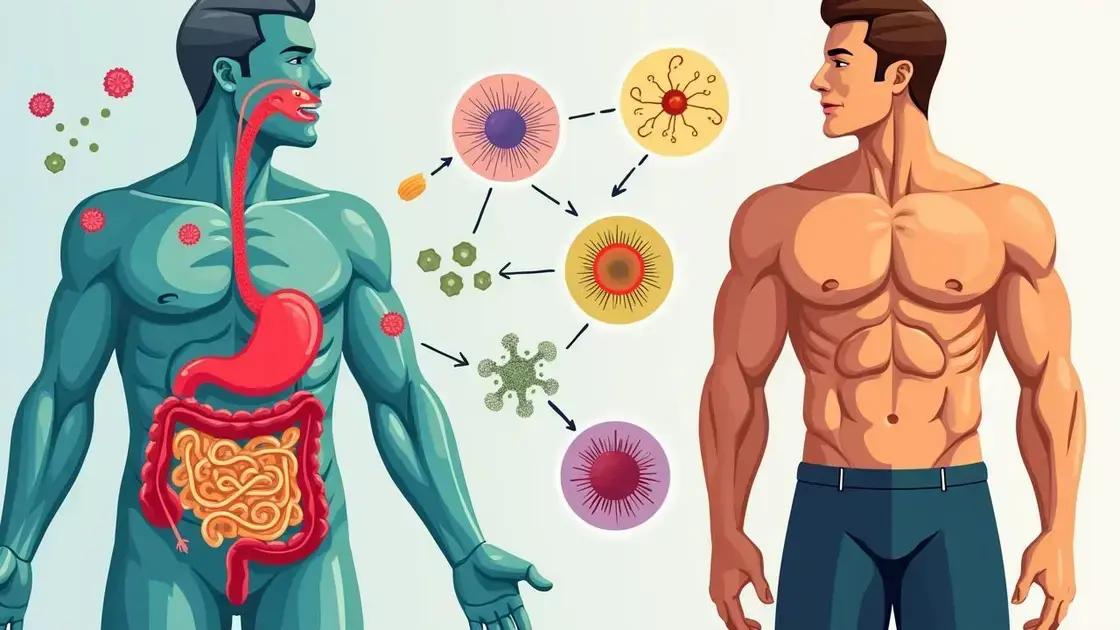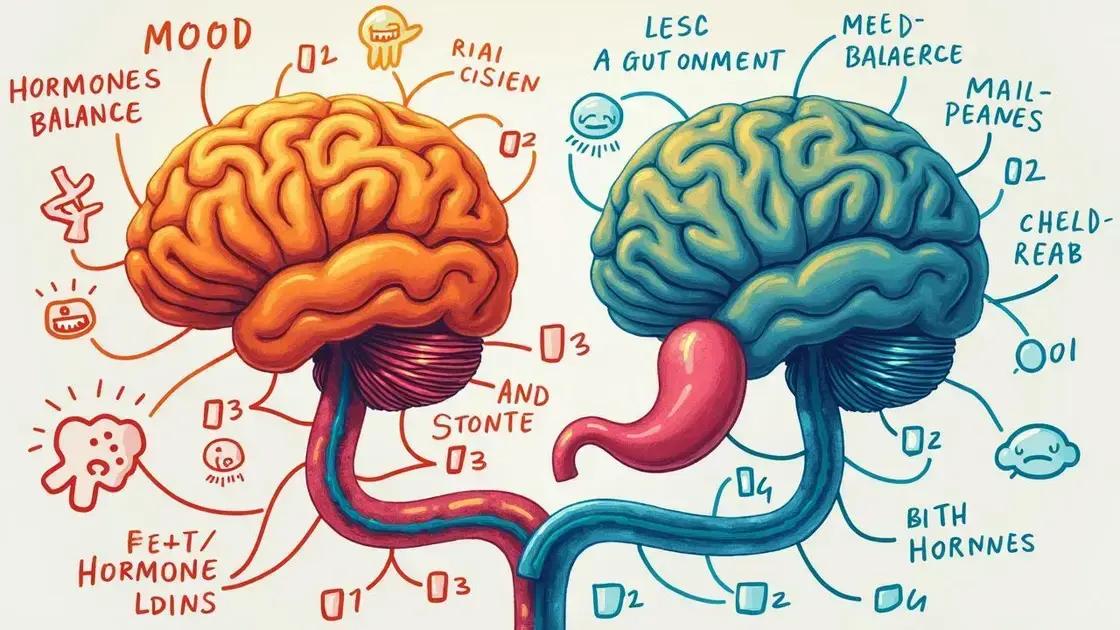The increasing focus on gut health for improved testosterone levels highlights the importance of maintaining a healthy gut microbiome through diet, exercise, and lifestyle changes. Fermented foods, fiber-rich fruits and vegetables, and stress management can significantly enhance gut health, leading to better hormonal balance and overall well-being.
As research continues to uncover the connection between gut health and overall well-being, the increasing focus on gut health for improved testosterone levels has gained significant attention. Men looking to enhance their testosterone levels may find that gut health plays a crucial role in achieving their goals. From dietary choices to lifestyle changes, understanding how these elements interact can lead to better health outcomes. In this article, we will delve into what gut health means, its impact on testosterone, and practical ways to improve it.
Understanding Gut Health and Testosterone

Gut health refers to the balance of microorganisms living in the digestive tract. These microorganisms play a vital role in various bodily functions, from digestion to the production of hormones. In recent studies, researchers have found a link between gut health and testosterone levels, highlighting the importance of maintaining a healthy gut to support male hormone levels.
The Importance of Gut Health
A healthy gut is essential for nutrient absorption, immune function, and even mental well-being. When the gut microbiome is out of balance, it can lead to inflammation, which negatively impacts testosterone production. Thus, keeping the gut healthy can result in not just better digestion but also in improved hormone levels.
How Gut Microbes Affect Testosterone
Certain gut microbes produce enzymes and metabolites that may influence hormone production. A diverse and balanced gut microbiome can help promote the synthesis of testosterone. Some studies suggest that probiotics can positively affect testosterone levels by supporting gut health and reducing inflammation in the body.
Signs of Imbalanced Gut Health
Recognizing the signs of imbalanced gut health can be the first step toward restoring hormone balance. Symptoms such as bloating, abdominal pain, and irregular bowel movements can indicate gut issues. Moreover, fatigue and decreased libido may also be signs of low testosterone linked to poor gut health.
Maintaining gut health through proper diet, lifestyle changes, and stress management can contribute significantly to overall hormone health. Taking proactive steps to improve gut microbiota can lead to increased testosterone levels, benefitting both physical and mental health.
The Gut-Brain Connection

The gut-brain connection refers to the bidirectional communication between the gastrointestinal tract and the brain. This connection highlights how gut health can affect mental states and vice versa. For men, a well-functioning gastrointestinal system can lead to better hormonal balance, including testosterone levels.
Impact of Gut Health on Mood
Research shows that the gut microbiome can impact mood and cognitive function. Neurotransmitters like serotonin, often called the “feel-good hormone,” are produced in the gut. When gut health is compromised, it may lead to mood swings or anxiety, which can indirectly affect testosterone levels.
The Role of Stress
Stress is known to affect both gut health and hormone levels. When experiencing stress, the body produces cortisol, a hormone that can decrease testosterone. Gut issues, such as inflammation, may further exacerbate feelings of anxiety, creating a cycle that can lead to low testosterone.
Supporting the Gut-Brain Connection
To boost the gut-brain connection, focus on a diet rich in fiber, probiotics, and prebiotics. Incorporating whole foods like fruits, vegetables, and fermented items can enhance gut health and support emotional well-being, which in turn can help maintain testosterone levels.
Practices such as mindfulness and meditation can also help reduce stress levels, positively impacting both gut health and hormone balance. By understanding and nurturing this connection, men can take proactive steps toward maintaining optimal testosterone levels.
Foods that Boost Gut Health

Foods that boost gut health are essential for maintaining a balanced microbiome. A healthy gut can support overall health and improve testosterone levels. Here are some foods to consider when aiming to enhance gut health.
Fermented Foods
Fermented foods contain beneficial probiotics that help support digestion. Foods like yogurt, kimchi, and kombucha are excellent sources. These foods introduce good bacteria into the gut, improving the microbiome balance.
Fiber-Rich Foods
Fiber is crucial for gut health. Foods rich in fiber, such as fruits, vegetables, and whole grains, help promote regular bowel movements and feed good gut bacteria. Aim for a variety of colors in your fruits and vegetables for the best results.
Prebiotic Foods
Prebiotics are compounds that nourish probiotics. Foods high in prebiotics include garlic, onions, and asparagus. Consuming these foods can enhance the growth of beneficial bacteria in the gut.
Omega-3 Fatty Acids
Omega-3 fatty acids found in foods like salmon, chia seeds, and walnuts can also support gut health. They may help reduce inflammation, creating a better environment for good bacteria to thrive.
Incorporating these foods into your diet can significantly improve gut health and, consequently, help maintain healthy testosterone levels. By eating a balanced diet rich in diverse nutrients, you can truly support your body’s natural functions.
Lifestyle Changes for Optimal Hormone Levels

Making lifestyle changes is key to supporting optimal hormone levels, including testosterone. Small adjustments in daily habits can lead to significant improvements in overall health and hormone balance. Here are some effective strategies to consider.
Regular Exercise
Engaging in regular physical activity is vital for maintaining healthy testosterone levels. Aim for a mix of cardio and strength training. Weight training, in particular, has been shown to boost testosterone production. Try to include at least 150 minutes of moderate exercise each week.
Quality Sleep
Getting enough quality sleep is essential for hormone regulation. Aim for 7-9 hours of sleep each night. Poor sleep can lead to reduced testosterone levels and increased stress hormones like cortisol. Create a comfortable sleep environment and establish a bedtime routine to improve your sleep quality.
Stress Management
High levels of stress can negatively impact testosterone production. Practice stress-reducing techniques such as mindfulness, meditation, or yoga. Even simple breathing exercises can help to lower stress and support hormonal balance.
Avoiding Toxins
Limit exposure to harmful chemicals like bisphenol A (BPA) and other endocrine disruptors found in plastics. Choose glass or stainless steel containers for food and drink. Reducing exposure to these toxins can help maintain optimal hormone levels.
Incorporating these lifestyle changes can greatly influence your hormone health. They can lead to enhanced testosterone levels and better overall well-being if followed consistently.
Taking Charge of Your Gut Health and Hormone Levels
As we have explored, the increasing focus on gut health plays a vital role in improving testosterone levels. By understanding the relationship between gut health and hormones, we can take actionable steps to enhance our overall well-being.
Incorporating gut-friendly foods, making lifestyle changes like regular exercise and stress management, and understanding the gut-brain connection are essential for maintaining optimal testosterone levels.
By prioritizing these aspects, you can support not just your gut health but also your hormonal balance and quality of life. Embrace these changes and pave the way to a healthier, more balanced you.
FAQ – Frequently Asked Questions about Gut Health and Testosterone
How does gut health affect testosterone levels?
Gut health influences hormone production and balance. A healthy gut microbiome can lead to better testosterone synthesis and overall hormone regulation.
What foods should I eat to improve gut health?
Incorporate fermented foods like yogurt and kimchi, fiber-rich fruits and vegetables, and prebiotic foods like garlic and onions to boost gut health.
Can exercise help maintain testosterone levels?
Yes, regular exercise, especially strength training, has been shown to boost testosterone levels and improve overall hormone balance.
What lifestyle changes can support optimal hormone levels?
Focus on getting quality sleep, managing stress, maintaining a balanced diet, and avoiding toxins to support hormonal health.
Is there a connection between mental health and gut health?
Absolutely! The gut-brain connection means that a healthy gut can enhance mood and mental well-being, contributing to better hormonal balance.
How can I reduce stress to support gut health?
Practicing mindfulness, yoga, and engaging in regular physical activity can significantly reduce stress levels, positively impacting gut health and hormones.












